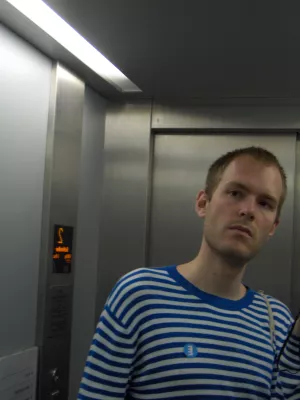
Jacob Korczynski
Doctoral student

I See/La Camera: I
Author
Other contributions
- Lucy Lippard
- Sol LeWitt
Summary, in English
What you hold in your hands is the outcome of an extensive research project into Babette Mangolte's film The Camera: Je, La Camera:1 (1977), and Lucy Lippard;s novel I See/ You Mean (1979), which took place in the frame of If I can't Dance's Performance in Residence programme with invited researcher Jacob Korczynski. Korczynski has investigated the relationship between the subjective role of the camera in Mangolte's film and the simultaneous exploration of text and image in Lucy Lippard's novek, situating I See/You Mean and The Camera: Je, La Camera: I in the context of feminist strategies of self-portraiture. Escheqing the authority of autobigraophy through the fluidity of fiction, both the novel and film are anchored by an affective address of image making, and at the centre of each, an opening emerges from the absence of the body of the author.
I see/You Mean is a novel by Lucy Lippard, and a unique part of this recognized critic and curator's oeuvre. "Through a collage of verbal photographs, overheard dialogue, sexual encounters, found material, and self--identification devices (astrology, the I Ching, palmistry, Tarot), it charts from past to future the changing currents between two women and two men...." The Camera:Je, La Camera: I is the second feature film by Babete Mangolte. "A going back and forth between observation and sentiment and/or imagination, the film is a self-portrait of the photographer-filmmaker during the years 1976-1977." In addition to her expensive practice in film and installation, Mangolte is also well known for her documentation of performance works of artists including Trisha Brown and Richard Foreman, and her cinematographic work with filmmakers such as Chantal Akerman and Yvonne Rainer.
A research essay by Korczynski forms the centre of this publication around which various other materials are situated. These include a visual esay by Babette Mangolte composed for this publication, and a collaborative text/drawing by Lucy Lippard and Sol LeWitt produced during the development of her novel. The aperture produced by Lippard and Mangolte is an invitation, as you and I, implicated temporally as we move through the pages of the novel and the frames of the film, occup a space they have vacated. The materials of the novel and film are not only text and image, but also my body and your body-an insistence on a presence that is our own.
I see/You Mean is a novel by Lucy Lippard, and a unique part of this recognized critic and curator's oeuvre. "Through a collage of verbal photographs, overheard dialogue, sexual encounters, found material, and self--identification devices (astrology, the I Ching, palmistry, Tarot), it charts from past to future the changing currents between two women and two men...." The Camera:Je, La Camera: I is the second feature film by Babete Mangolte. "A going back and forth between observation and sentiment and/or imagination, the film is a self-portrait of the photographer-filmmaker during the years 1976-1977." In addition to her expensive practice in film and installation, Mangolte is also well known for her documentation of performance works of artists including Trisha Brown and Richard Foreman, and her cinematographic work with filmmakers such as Chantal Akerman and Yvonne Rainer.
A research essay by Korczynski forms the centre of this publication around which various other materials are situated. These include a visual esay by Babette Mangolte composed for this publication, and a collaborative text/drawing by Lucy Lippard and Sol LeWitt produced during the development of her novel. The aperture produced by Lippard and Mangolte is an invitation, as you and I, implicated temporally as we move through the pages of the novel and the frames of the film, occup a space they have vacated. The materials of the novel and film are not only text and image, but also my body and your body-an insistence on a presence that is our own.
Publishing year
2014-11-30
Language
English
Publication/Series
Performance in Residence
Document type
Book
Publisher
If I Can't Dance I Don't Want to Be Part of Your Revolution
Topic
- Visual Arts
Status
Published
ISBN/ISSN/Other
- ISBN: 978-90-814471-5-7